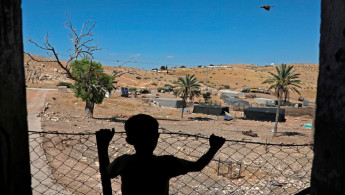Israeli forces confiscate tractors from Palestinian farmers in Jordan Valley
Israeli forces confiscated Palestinian agricultural vehicles in the occupied West Bank's Jordan Valley on Wednesday, as their attempts to expel farmers and build illegal settlements continue.
Israeli soldiers carried out raids in a number of areas in the northern Jordan Valley on Wednesday morning and seized several tractors and other vehicles owned by Palestinian farmers, according to the Palestinian Authority's Wafa news agency.
Local activists say that such assaults on Palestinian farmers in the area have increased in recent months in an attempt to force Palestinians off of their land to build illegal settlements.
On top of the settler violence and expulsions suffered by Palestinians in other parts of the West Bank, Palestinians in the Jordan Valley also often have their solar panels confiscated and are refused access to water.
Israel has occupied the West Bank illegally since 1967, and commits various abuses against Palestinian residents, human rights groups say.
More than 700,000 Jewish Israelis live in settlements in the occupied West Bank and East Jerusalem, in constructions considered illegal under international law.
The Oslo agreement of 1995 divided the occupied West Bank into three zones: Area A, Area B, and Area C.
Area A is under the administrative and security control of the Palestinian Authority (PA). Area B's administration is controlled by the PA, with Israel controlling security. Area C is under full administrative and security control of Israel.
The Jordan Valley falls within the West Bank's "Area C", which is fully controlled by Israel's army.
Under Israeli military law, Palestinians cannot build structures in the area without permits, which are typically refused, and demolitions are common.





 Follow the Middle East's top stories in English at The New Arab on Google News
Follow the Middle East's top stories in English at The New Arab on Google News


